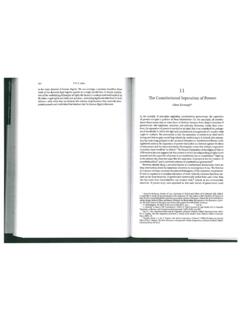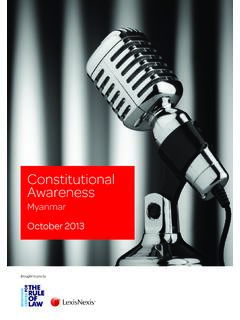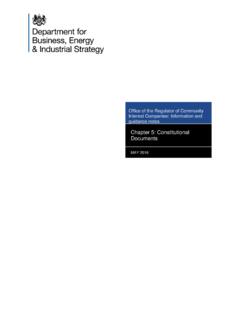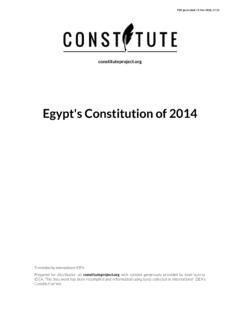Transcription of Constitutional Law-II : Notes for B.A. LL.B fourth ...
1 Constitutional Law-II : Notes for fourth semester Paper Code: 204 Unit-1: - Introduction: a. Definition of State for enforcement of fundamental rights Justifiability of fundamental rights Doctrine of eclipse, severability, waiver. b. Right to equality Doctrine of Reasonable classification and the principle of absence of arbitrariness Legitimate Expectation Principles of Compensatory Discrimination c. Fundamental freedom: Freedom of speech and expression, freedom of press and media expansion by judicial interpretation reasonable restrictions Unit-2: - Fundamental Rights II a.
2 Right to life and personal liberty scope and content Expensive interpretation: Gays rights Right to Privacy Live-in Relationships b. Right to Education Act, 2009 c. Right against exploitation Forced labour, child employment and human trafficking d. Freedom of religion and Cultural and Educational Rights of Minorities Professional Skill Development Activity (PSDA): Drafting of a Writ Petition Unit III- Right to Constitutional Remedies a. Writs Hebeas Corpus, Mandamus, Certiorari, Prohibition and Quo-warranto b. Art 32 and 226 c. Judicial Review d. Writ Jurisdiction and Private sector Unit IV- Directive Principles and Fundamental Duties a.
3 Nature and justiciability of the Directive Principles b. Detailed Analysis of Directive Principles c. Fundamental Duties e. Inter-relationship between Fundamental Rights and Directive Principles Unit-I Fundamental Rights-Part 1: State- Article 12: The Constitution of India, Article 12: In this part, unless the context otherwise requires, the State includes the Government and Parliament of India and the Government and the Legislature of each of the States and all local or other authorities within the territory of India or under the control of the Government of India. Tests to decide which other authorities could be considered as agencies or instrumentalities of state.
4 The cumulative effect of all the following factors has to be seen: 1. If the entire share capital of the corporation is held by government, it would go a long way towards indicating that the corporation is an instrumentality or agency of government. 2. The existence of deep and pervasive State control may afford an indication that the Corporation is a State agency or instrumentality. 3. It may also be a relevant the corporation enjoys monopoly status which is State conferred or State protected. 4. If the functions of the corporation are of public importance and closely related to governmental functions, it would be a relevant factor in classifying the corporation as an instrumentality or agency of government.
5 5. Specifically, if a department of government is transferred to a corporation, it would be a strong factor supportive of this inference of the corporation being an instrumentality or agency of government. SomPrakashRekhi v. Union of India AIR 1981 SC 212: (1981) 1 SCC 449 Page 3 of 72 The petitioner was a clerk in the Burmah Shell Oil Storage Ltd. He retired at the age of 50 after qualifying for a pension, on April 1, 1973. He was also covered by a scheme under the Employees Provident Funds and Family Pension Fund Act, 1952. The employer undertaking was statutorily taken over by the Bharat Petroleum Corporation Ltd.
6 Under the Burmah Shell (Acquisition of Undertakings in India) Act, 1976, and the Corporation became the statutory successor of the petitioner employer. His pensionary rights, such as he had, therefore, became claimable from the second respondent. The pensionary provision for the Burmah Shell employees depended on the terms of a Trust Deed of 1950 under which a Pension Fund was set up and regulations were made for its administration. By virtue of Regulation 13, the petitioner was entitled to a pension of Rs. subject to certain deductions that formed the controversy in this case.
7 He was also being paid Supplementary Retirement Benefit of Rs. 86/- per month for a period of 13 months after his Retirement, which was stopped thereafter. By a letter dated September 25, 1974, the employer (Burmah Shell) explained that from out of the pension of Rs. Regulation 16 authorized two deductions. One such deduction was based on Regulation 16(1) because of Employees Provident Fund payment to the pensioner and the other rested on Regulation 16(3) on account of payment of gratuity. Resultantly, the pension payable was shown as Rs Further, the petitioner claimed and received his provident fund amount under the PF Act and recovered a gratuity amount due under the Payment of Gratuity Act, 1972.
8 The Burmah Shell that consequent on his drawal of provident fund intimated the petitioner and gratuity benefits; the quantum of his pension would suffer a protanto shrinkage, leaving a monthly pension of Rs 40/-. Since no superannuated soul can survive on Rs. 40/- per month, the petitioner moved the court challenging the deductions from his original pension as illegal and inhuman and demanding restoration of the full sum, which he was originally drawing. According to the petitioner, his right to property under Article 19 had been violated. The first issue before the Supreme Court was whether a writ could be issued under Article 32 of the Constitution against the BPCL, a government company.
9 The expression other authorities in Article 12 has been held by this Court in the Rajasthan State Electricity Board case [Rajasthan Electricity Board v. Mohan Lal, AIR 1967 SC 1857] to be wide enough to include within it every authority created by a statute and functioning within Page 4 of 72 the territory of India, or under the control of the Government of India. This Court further said referring to earlier decisions that the expression other authorities in Article 12 will include all Constitutional or statutory authorities on whom powers are conferred by law.
10 The State itself is envisaged under Article 298 as having the right to carry on trade and business. The State as defined in Article 12 is comprehended to include bodies created for the purpose of promoting economic interests of the people. The circumstance that the statutory body is required to carry on some activities of the nature of trade or commerce does not indicate that the Board must be excluded from the scope of the word State . The Electricity Supply Act showed that the Board had power to give directions, the disobedience of which is punishable as a criminal offence.








